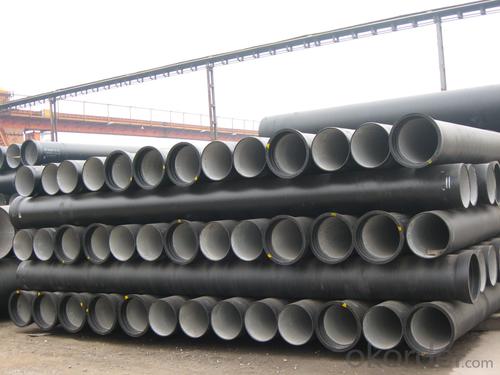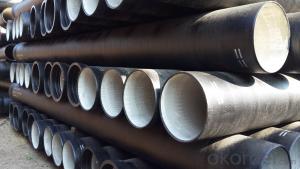Ductile Iron Pipe DN350
OKorder Service Pledge
Quality Product, Order Online Tracking, Timely Delivery
OKorder Financial Service
Credit Rating, Credit Services, Credit Purchasing
You Might Also Like
Specifications
Quick Details
| Place of Origin: | China (Mainland) | Brand Name: | CMAX | Model Number: | T type / K type / Flange type |
| Length: | 6m / 5.7m / Negotiable | Standard: | ISO2531 / EN545 / EN598 | Application: | Potable / Sewage water |
| Diameter: | DN80~DN2200 | Shape: | Round | Hardness: | 230 |
| Pipe Wall Thickness: | standard | Pull Strength: | 420 | Yield (≥ MPa): | 300 |
| Material: | Ductile Iron | Type: | Centrifugal ductile cast iron pipe | Certification: | ISO2531 / EN545 / EN598 |
| Outer Diameter: | 80-2200 | Thickness: | standard | Specification: | DN80~DN2200 |
| |
The advantages to the customer:
Trustworthy financial strength.
One-stop shopping.
Fast and efficient service.
Coordination of shipments from multiple plants.
Specialists of the overseas shipping process.
A more competitive price.
- Q: Can ductile iron pipe be used for trenchless installation methods?
- Yes, ductile iron pipe can be used for trenchless installation methods. Trenchless installation methods, such as pipe bursting or horizontal directional drilling, are suitable for various pipe materials including ductile iron. Ductile iron pipes are known for their strength, durability, and flexibility, making them suitable for trenchless methods where the pipe needs to be installed without an open trench.
- Q: What is cast iron pipe, specification for cast iron pipe?
- Ductile iron pipes are more expensive, but the production methods are different.
- Q: Fire water supply network adopts ductile iron pipe, the test pressure should be no more than MPa
- Strictly speaking: the outer pipe network and the internal pipe network are the same. Minimum fire 1.0MPa, minimum sprinkler 1.4MPa. Because not only in accordance with the water pump, but also take into account the pressure on the fire engine.
- Q: Can ductile iron pipes be used for trenchless pipe rehabilitation methods?
- Yes, ductile iron pipes can be used for trenchless pipe rehabilitation methods. Trenchless methods such as cured-in-place pipe lining or pipe bursting can effectively repair and rehabilitate ductile iron pipes without the need for extensive excavation. These methods provide a cost-effective and efficient solution for rehabilitating aging or damaged ductile iron pipes while minimizing disruption to the surrounding environment.
- Q: How can 4 inch ductile iron pipe be connected with 2 inch galvanized pipe?
- The general electric welded steel pipe for clarinet.
- Q: Can ductile iron pipes be used for stormwater management systems?
- Indeed, stormwater management systems can utilize ductile iron pipes. Renowned for their robustness and lastingness, ductile iron pipes prove fitting for diverse purposes, including stormwater management. These pipes exhibit resistance against corrosion and possess the ability to endure immense pressure, rendering them perfect for transporting stormwater runoff. Moreover, ductile iron pipes boast an extended lifespan, thereby minimizing the necessity for frequent replacements and upkeep. All in all, when it comes to stormwater management systems, ductile iron pipes serve as a dependable option.
- Q: The benefits of ductile iron castings
- Its performance is close to carbon steel, but it has good casting performance, easy molding, better machinability than cast steel, better heat resistance, corrosion resistance and wear resistance than steel. And a very important one: cheap.
- Q: What are the typical joint sealing requirements for ductile iron pipes?
- The typical joint sealing requirements for ductile iron pipes include the use of rubber gaskets or mechanical joints. Rubber gaskets are commonly used for joint sealing in ductile iron pipes as they provide a reliable and flexible seal. These gaskets are typically made of synthetic rubber materials that are resistant to water, chemicals, and other environmental factors. Mechanical joints, on the other hand, are another common method of joint sealing in ductile iron pipes. These joints consist of a mechanical device that connects the pipes together and provides a watertight seal. Mechanical joints are typically designed to allow for some movement and flexibility, which is especially important in areas where ground movement or settlement may occur. In addition to using rubber gaskets or mechanical joints, it is also important to properly clean and prepare the pipe surfaces before making the joint. This may involve removing any dirt, debris, or old joint material from the pipe ends to ensure a proper seal. The joint should then be assembled according to the manufacturer's instructions, ensuring that the gasket or mechanical joint is correctly positioned and tightened to the recommended torque. Overall, the typical joint sealing requirements for ductile iron pipes involve the use of rubber gaskets or mechanical joints, proper cleaning and preparation of the pipe ends, and following the manufacturer's instructions for assembly. These requirements are essential for ensuring a watertight and durable joint that can withstand the pressures and environmental conditions commonly encountered in ductile iron pipe systems.
- Q: Nodular cast iron, heat treatment process and so on
- High temperature graphitization annealing was adopted to eliminate the chill, and 900-950 and 2-4H obtained ferrite structure
- Q: What is the average diameter range of ductile iron pipes?
- The average diameter range of ductile iron pipes is typically between 3 inches to 64 inches.
Send your message to us
Ductile Iron Pipe DN350
OKorder Service Pledge
Quality Product, Order Online Tracking, Timely Delivery
OKorder Financial Service
Credit Rating, Credit Services, Credit Purchasing
Similar products
Hot products
Hot Searches
Related keywords






















